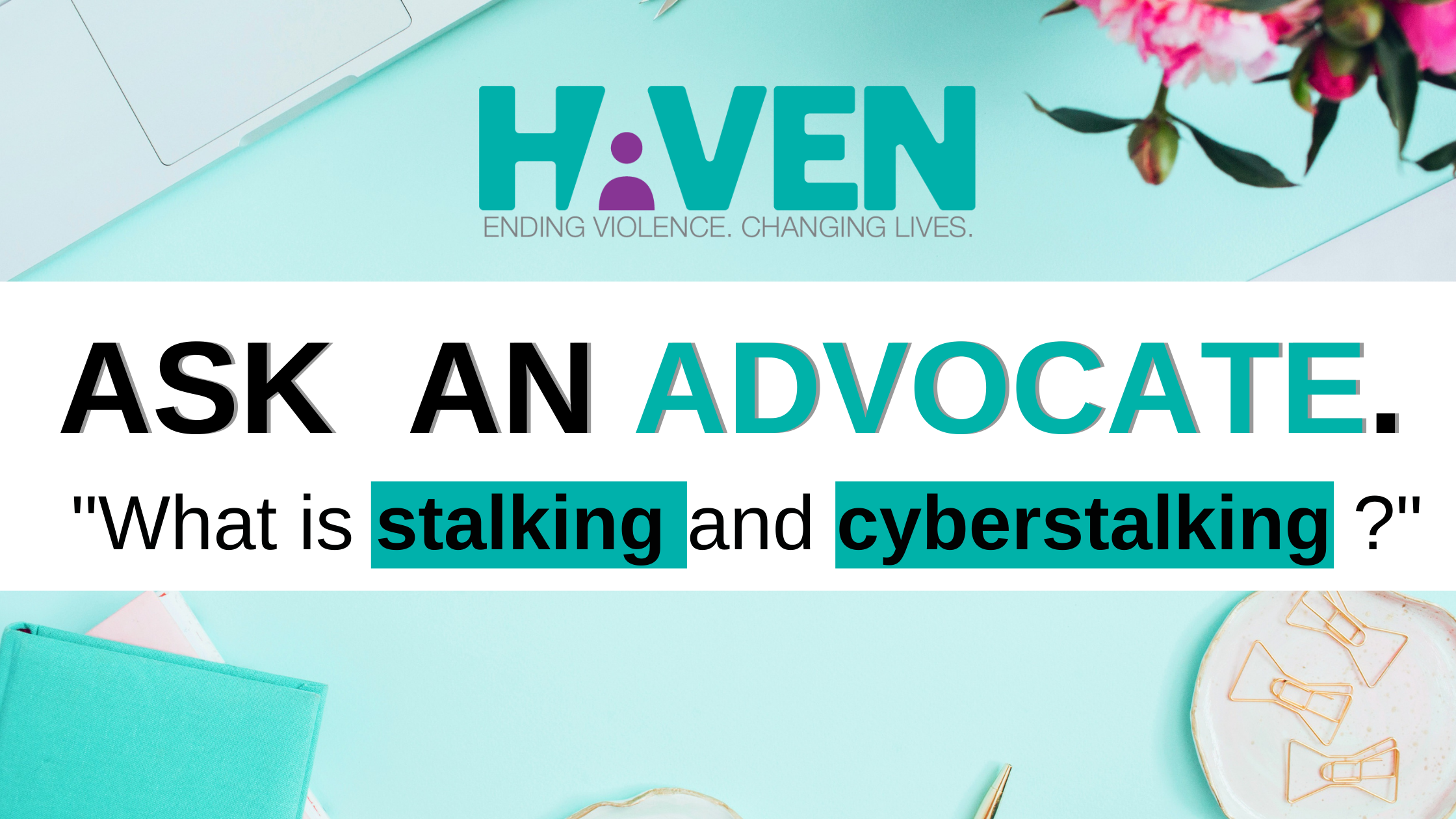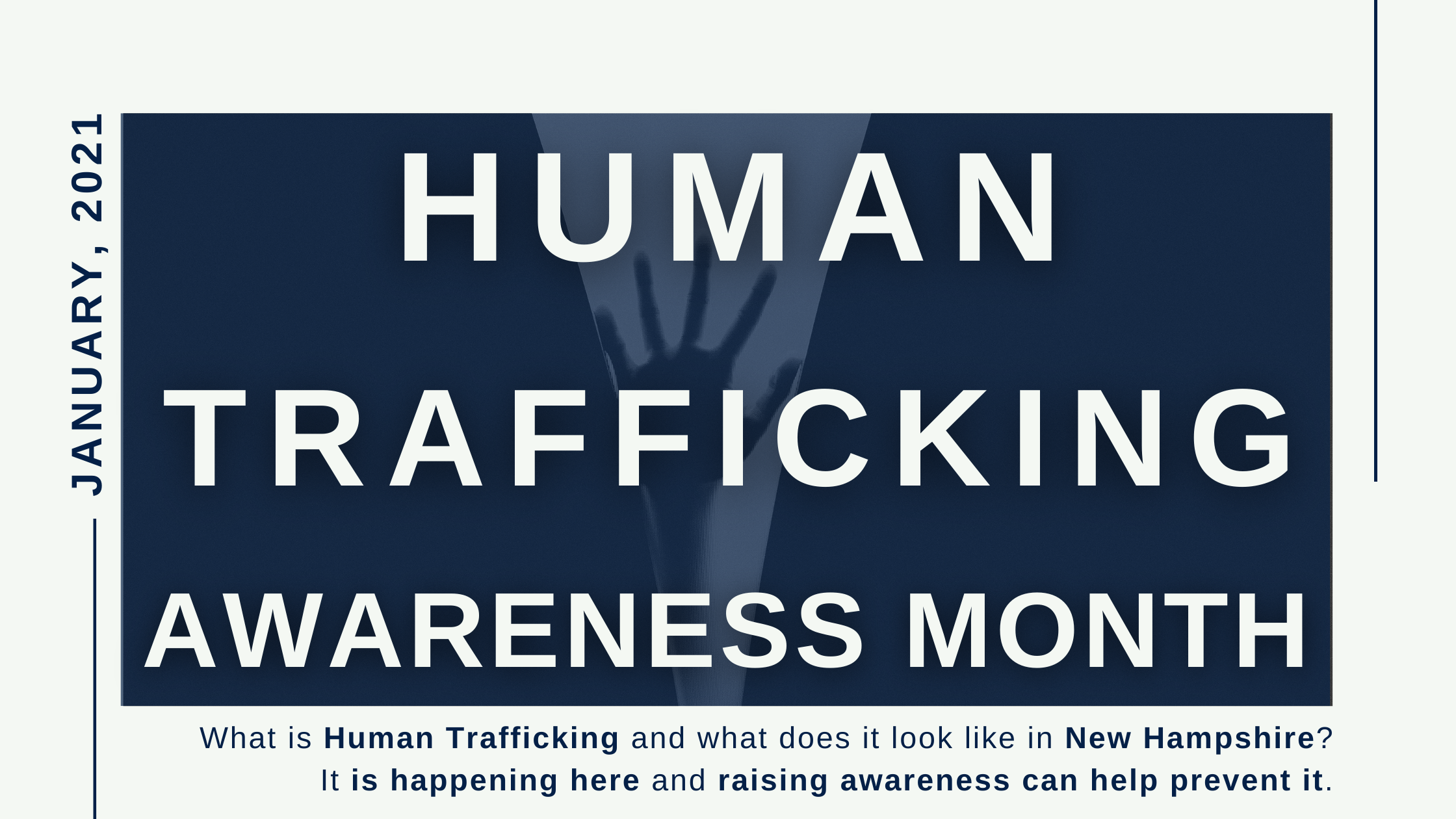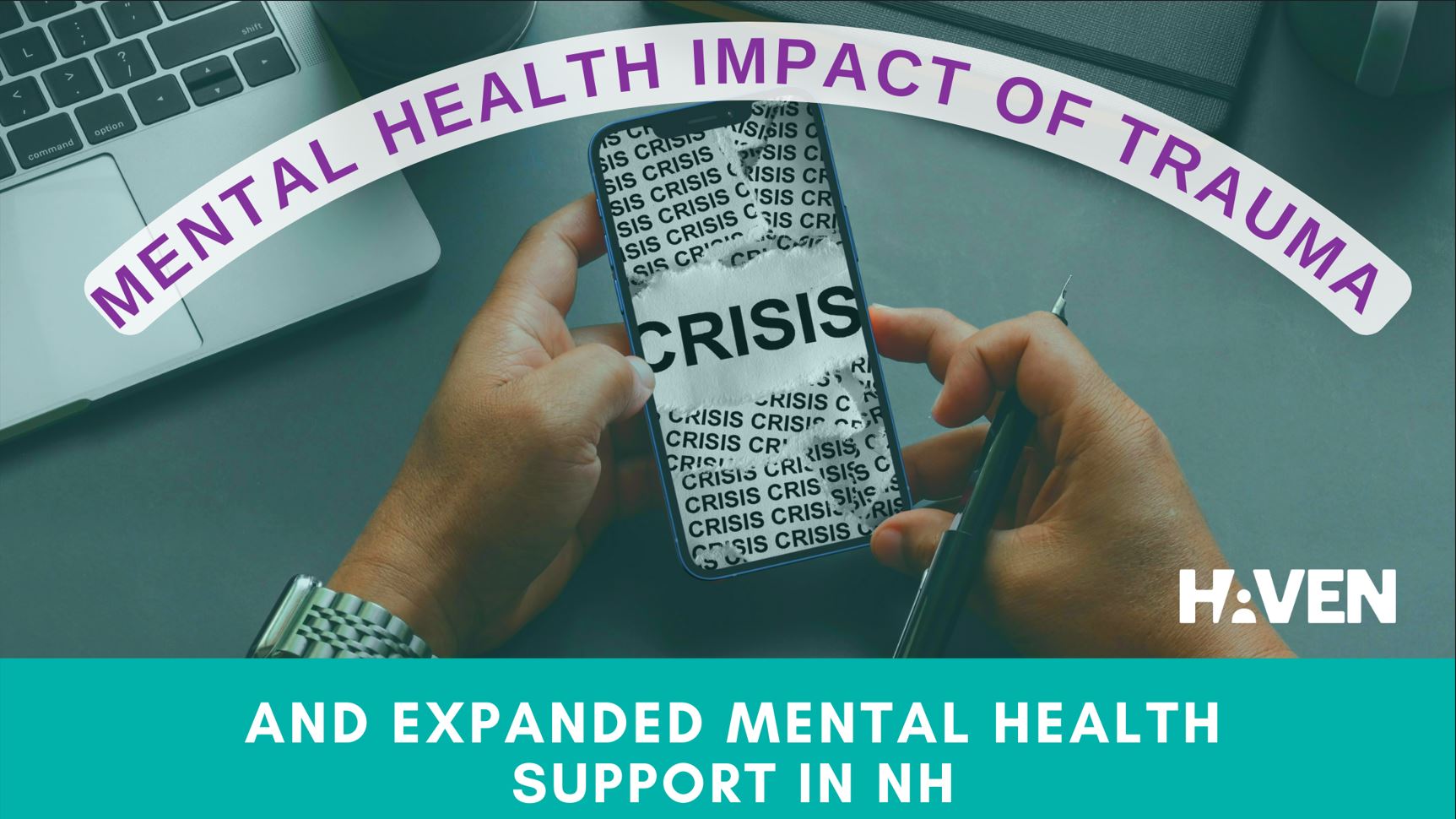
Ask an advocate: What is stalking and cyberstalking?
- HAVEN Staff
- January 11, 2022
- Uncategorized
- 0 Comments
January is Stalking Awareness Month, so it’s a great time to delve into this very common and very frightening kind of criminal behavior. Stalking is, in fact, a crime in every state across the U.S. At HAVEN, we are committed to helping anyone impacted by stalking to secure the support and protection they deserve. Stalking can take shape in many forms and sometimes it can be hard to identify. We asked our advocate, Ari, to share helpful information about stalking for our this edition of “Ask an advocate.”. Here is what they had to say:
Q: What is stalking?
Stalking is a pattern of behaviors directed at a specific person that would cause a reasonable person to feel fear.
Ari: The term “reasonable person to feel fear” really just means “what makes the average person feel afraid”. Fear is how we differentiate stalking from other crimes, like harassment (which may cause irritation, not so much fear). And fear is not the only feeling that a victim may experience. People being stalked may also feel angry, frustrated, or hopeless. You might even feel like you are going crazy.
The repeated contacts, or the “pattern of behaviors,” are unwanted, unpredictable, and dangerous. Stalking is not the way a stalker shows love and affection. People stalk to assert power and control over their victim.
Other crimes are often paired with stalking, including threats to a person’s wellbeing, physical and sexual assault, property damage, identity theft, and more. If you think you may be experiencing stalking, please consider seeking 24-hour free and confidential help from HAVEN advocates who can help you safety plan and explore your options.
Q: How common is stalking?
Ari: More than 1 in 6 women and 1 in 17 men have experienced stalking. People of all ages and walks of life are impacted by stalking. The most important thing I share with clients is that IT IS NOT YOUR FAULT! It can happen to anyone by anyone.
Q: How do I know if someone is stalking me?
Ari: Two or more of the following incidents could indicate you are being stalked:
- Being followed or watched.
- Repetitive and/or prank phone calls, texts, and e-mails.
- Waiting at or showing up at the places you go, for example, your work, the gym, your child’s daycare, etc.
- Following, calling, or otherwise interacting with your friends, family, colleagues, or pets in an unwanted manner.
- Use of tracking software on your electronics.
- Creating fake Facebook profiles or other accounts to interact with you.
- Property invasion or property damage.
- Causing problems with finances, like running up credit card debt or stealing your identity.
- Showing up at your work or constantly calling you at work, which can lead to you losing or quitting your job.
- Public humiliation and/or spreading rumors.
- Interfering with your ability to leave (the home, relationship etc.)
- Road Rage to instill fear.
- Physical or Sexual Abuse.
- Threats to you/themselves/others.
The incidents can be the same behaviors inflicted repeatedly, or a combination of different behaviors. Remember, if the pattern of behaviors make you feel afraid, it’s so important that you trust your gut.
Q: What can I do to try to stay safe and minimize the risk?
Ari: We cannot predict how and when a stalker may act. And we want you to stay as safe as possible. Of course, you shouldn’t have to change your behaviors or your activities, and we know it’s not fair. But the following options may enhance your sense of safety and make it harder for the stalker to track you:
- Consider varying your routine and schedule. Take different routes to school, work, shopping, the gym, and other regularly visited places. Perhaps change up the places you go regularly.
- Keep a log of incidents. This includes what the behavior was, the date and time of an incident, and any other pertinent information.
- Save all evidence like emails, text messages, photos, and posts on social media.
- Call the HAVEN hotline (or your local crisis center) to safety plan with an advocate.
- Tell your family, friends, neighbors, and coworkers that your stalker’s presence is not welcome. Share photos so they know who to be aware of.
- Call the police if you are in immediate danger.
- Consider seeking a protective order. HAVEN can help with this!
It can also be helpful to keep track of any changes in contact. Has the stalker’s behavior changed? Do they contact more often? Has it been awhile since you last heard from your stalker? Has the perpetrator obtained any weapons? Also, be alert of any changes in substance abuse or mental health.
Some people feel that it may be beneficial to stay in contact with the perpetrator. This method is not for everyone but sometimes survivors feel safer to know what their perpetrator might be up to. Please call a HAVEN advocate to safety plan around this.
Interested to learn more about your own possible risk level? The Stalking and Harassment Assessment and Risk Profile (SHARP) is a danger assessment tool that focuses on stalking specifically. It is free to use online at http://coercivecontrol.org and provides a narrative report as well an assessment of risk. Please remember that threat levels can change over time and constant risk assessment is vital.
For more safety planning tips, please visit https://www.stalkingawareness.org/wp-content/uploads/2018/11/Safety-Strategies.pdf
Q: What evidence do victims need to collect in order to get help from police?
A: Keep a Stalking Incident Log. This is a helpful way to track information and share it with the police. Items to include in the log are:
- The date and time of the incident
- A description of what took place and where it happened.
- Names and contact information of any witnesses.
- If a police officer responded to the incident, include the officer’s name, badge number, and report number.
Here is an example of a stalking log for you to use: https://www.stalkingawareness.org/wp-content/uploads/2018/07/SPARC_StalkingLogInstructions_2018_FINAL.pdf
Q: Is it only considered stalking if it is my ex-partner?
Ari: A stalker is usually someone that the victim knows. Sometimes on the news, we hear about celebrity stalking but being stalked by a stranger is not as common, happening 15% of the time for female victims and 17% of the time for male victims. Most of the time, stalkers are current or former intimate partners, or acquaintances. Stalkers can also be family members or persons of authority.
Keep in mind that intimate partners can be more dangerous. They have knowledge of your schedule, social network, and, sometimes, accounts and passwords. They have access to personal information and know what could upset you. They are more likely to attack, use weapons, escalate their behavior, and re-offend.
But remember, anyone can stalk anyone. It is not your fault and you do not deserve to ever be in that position.
Q: My boyfriend is being stalked by his ex-girlfriend. She is now targeting me. Could she be dangerous?
Ari: Unfortunately, there is no single psychological or behavioral profile that predicts what stalkers will and will not do. A stalker’s behavior can escalate from more indirect ways of making contact (like phone calls or text messages) to more direct contact (like showing up at your work or school).
Trust your gut. Call the police if you are in immediate danger. Keep a log. Save evidence such as e-mails, texts, photos, posts on social media. Call the HAVEN hotline or your local crisis center for help safety planning and support through this process.
Q: I moved to a new address, but I am afraid my stalker can still track me down. What can I do?
Ari: People attempting to escape from domestic violence, sexual assault, or stalking situations frequently move to a new home to prevent their abusers from finding them. The Address Confidentiality Program allows victims who have a change of address the opportunity to keep their new address confidential. Please see https://www.doj.nh.gov/criminal/victim-assistance/address-confidentiality.htm for more information.
Q: What is Cyberstalking?
Ari: Cyberstalking is when a stalker uses electronics to harass and stalk the victim. Examples of cyber-stalking include planting recording devices inside the home of their victim to listen to their conversations, placing tracking devices on the victim’s vehicle to follow their location, sending unwanted calls and texts from unknown numbers to harass the victim, and hacking into the victim’s personal accounts to access private information. Just like physical stalking, cyber-stalking is concerning because it often makes the victim feel as though they are being watched, listened to, and followed all the time. For more information visit https://techsafetyapp.org.
Q: How can I prevent cyberstalking?
Ari: There are many tips and tricks survivors can use to protect themselves. A few important things you can do are:
- Set different and difficult passwords for personal accounts.
- Consider getting a new phone number if possible.
- Shut off Bluetooth if you don’t need to use it.
- Look at privacy settings on different devices to make sure you know how your location is being shared.
- Look through your apps on your devices – if you do not recognize something, delete it.
- Many apps used for stalking are disguised and hard to see.
- Be careful with whom you share important and personal information.
Hopefully, these tips are helpful to you and loved ones. Stalking can be hard to identify and even harder to address. As always, HAVEN advocates are available 24/7 to support and to safety plan with survivors and their loved ones who may be impacted by stalking. You do not have to go through this alone, support is always available. HAVEN advocates can be reached for free, confidential support 24 hours a day at 1.603.994.SAFE (7233). To learn more about the topic of stalking, visit the Stalking Prevention, Awareness, Resource Center: https://www.stalkingawareness.org/




